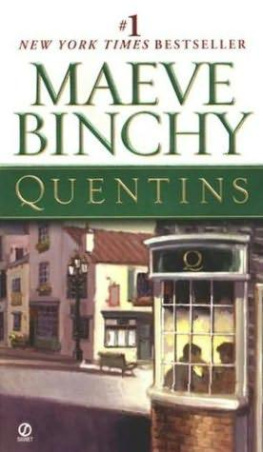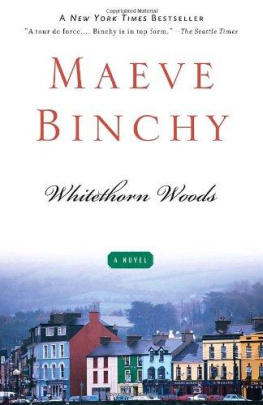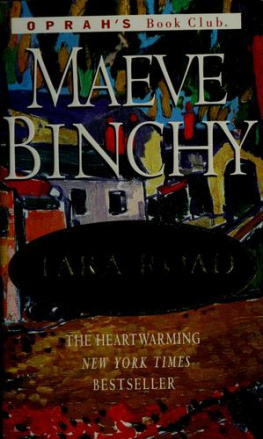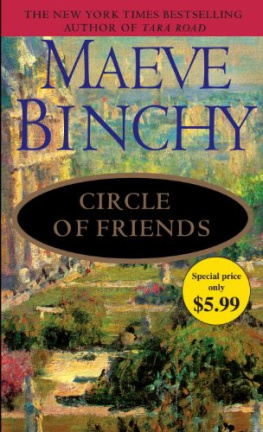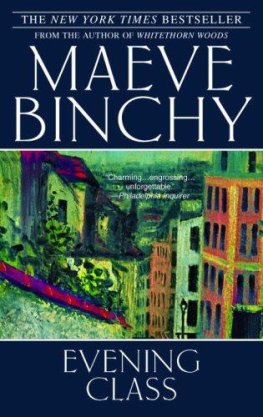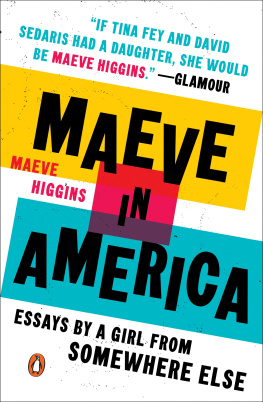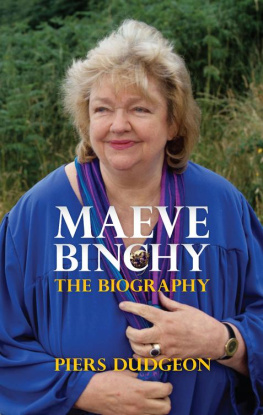Maeve Binchy - Quentins
Here you can read online Maeve Binchy - Quentins full text of the book (entire story) in english for free. Download pdf and epub, get meaning, cover and reviews about this ebook. year: 2008, publisher: NAL Trade, genre: Prose. Description of the work, (preface) as well as reviews are available. Best literature library LitArk.com created for fans of good reading and offers a wide selection of genres:
Romance novel
Science fiction
Adventure
Detective
Science
History
Home and family
Prose
Art
Politics
Computer
Non-fiction
Religion
Business
Children
Humor
Choose a favorite category and find really read worthwhile books. Enjoy immersion in the world of imagination, feel the emotions of the characters or learn something new for yourself, make an fascinating discovery.
- Book:Quentins
- Author:
- Publisher:NAL Trade
- Genre:
- Year:2008
- Rating:5 / 5
- Favourites:Add to favourites
- Your mark:
- 100
- 1
- 2
- 3
- 4
- 5
Quentins: summary, description and annotation
We offer to read an annotation, description, summary or preface (depends on what the author of the book "Quentins" wrote himself). If you haven't found the necessary information about the book — write in the comments, we will try to find it.
Quentins — read online for free the complete book (whole text) full work
Below is the text of the book, divided by pages. System saving the place of the last page read, allows you to conveniently read the book "Quentins" online for free, without having to search again every time where you left off. Put a bookmark, and you can go to the page where you finished reading at any time.
Font size:
Interval:
Bookmark:
QUENTINS
by Maeve Binchy
Also by Maeve Binchy
Light a Penny Candle
Echoes London Transports
Dublin 4
The Lilac Bus
Firefly Summer
Silver Wedding
Circle of Friends
The Copper Beech
The Glass Lake
Evening Class
Tara Road Scarlet Feather
Cross Lines (short stories) Aches & Pains (nonfiction)
QUENTINS
Maeve Binchy
TED SMART
Copyright Maeve Binchy 2002 All rights reserved
The right of Maeve Binchy to be identified as the author of this work has been asserted by her in accordance with the Copyright, Designs and Patents Act, 1988
All rights reserved. No part of this publication may be reproduced, stored in a retrieval system, or transmitted, in any form or by any means, electronic, mechanical, photocopying, recording or otherwise, without the prior permission of the copyright owner.
First published in Great Britain in 2002 by Orion,
an imprint of the Orion Publishing Group Ltd, Orion House, 5 Upper St Martin's Lane, London WC2H 9EA
This edition produced for The Book People Ltd Hall Wood Avenue, Haydock, St Helens way Hul
A CIP catalogue record for this book is available from the British Library
isbn o 75285 165 9 (hardback) isbn o 75285 350 3 (trade paperback)
Typeset by Deltatype Ltd, Birkenhead, Wirral
Printed in Great Britain by
Clays Ltd, St Ives pic
To my dear good Gordon. Thank you for a lifetime of generosity, understanding and love.
Chapter One.
When Ella Brady was six she went to Quentins. It was the first time anyone had called her Madam. A woman in a black dress with a lace collar had led them to the table. She had settled Ella's parents in and then held out a chair for the six-year-old.
"You might like to sit here, Madam, it will give you a full view of everything," she said. Ella was delighted and well able to deal with the situation.
"Thank you, I'd like that," she said graciously. "You see, it's my very first time here." This was in case anyone might mistake her for a regular diner.
Her mother and father probably were looking at her dotingly, as they always did. That's what all the childhood pictures showed, anyway ... complete adoration. She remembered her mother telling her that she was the best girl in the world, and her father saying it was a great pity he had to go off to the office every day, otherwise he would stay at home with the best girl.
Once Ella asked why she didn't have sisters and brothers like everyone else seemed to. Her mother said that God had only sent one to this family, but weren't they lucky that it was such a wonderful one. Years later, Ella learned of the many miscarriages and false hopes. But at the time the explanation satisfied her completely, and it did mean that there was no one she had to share her toys or her parents with and that had to be good. They took her to the zoo and introduced her to the animals, they brought her
to the circus whenever it came to town, they even went for a weekend to London and took her picture outside Buckingham Palace. But somehow nothing was ever as important as that first visit to a grown-up restaurant, where she had been called Madam and given a seat with a good view.
The Bradys lived in Tara Road, in a house which they had bought years ago before prices started to rocket. It was a tall house with a big back garden where Ella could invite her friends from school. The house had been divided into apartments when the Bradys bought it. So there was a bathroom and kitchenette on every floor. They had restored most of it to make it a family home but Ella's friends "were very envious that she had what was like a little world of her own. It was a peaceful, orderly life. Her father Tim had a twenty-two-minute walk to the office every day, and twenty-nine minutes back on the return journey, because he paused to have a half-pint of beer and read the evening paper.
Ella's mother, Barbara, only worked mornings. She was the one who opened up the solicitors" offices right in town near Merrion Square. They trusted her utterly, she always said proudly, to have everything ready when the partners arrived in at 9.30 a.m. All their mail would be on their desks sorted for them. Someone to answer early-morning phone calls and to imply that they were already at work. Then she would go through the huge collection in what was called Barbara's Basket, where they all left anything at all to do with money. Barbara thought of herself as a super-efficient bookkeeper, and she controlled the four disorganised, crusty lawyers she worked for with iron rules. Where was this receipt for transport undertaken in the course of a case? Where was that invoice for the new stationery that someone had ordered? Obediently, like small boys, they delivered their accounts to her and she kept them in great ledgers. Barbara dreaded the day when they would all become computerised. But it was still far away. These four would move very slowly. They would have liked the quill pen to work with had they been given a choice!
Barbara Brady left the office at lunchtime. At first she needed to do this in order to pick Ella up from school, but even when her daughter was old enough to return accompanied only by a crowd of laughing girls, Barbara continued the routine of working a half day only. Barbara knew that she achieved more in her four-and-a half-hour stint than most others did in a full day. And she knew that her employers realised this too. So she was always in the
house when Ella returned. It all worked out very well. Ella had somebody at home to provide a glass of milk and shortbread and to listen to her colourful account of the events of the day, this drama and that adventure. Also, to help her with what homework needed to be done.
This system meant that Tim Brady had an orderly house and a good cooked meal to return to when he got back from the investment brokers where he worked with ever-increasing anxiety over the years. And when he came home every evening at the same time, Ella had a second audience for her marvellous people-filled stories. And the lines of care would fall gradually from his face as she followed her father around the garden, first as a toddler then as a leggy schoolgirl. She would ask questions about the office that her own mother would never dare to ask. Did they think well of Daddy at the office? Was he ever going to be in charge? And later, when it was clear to Ella how unhappy her father was, she asked him why he didn't go somewhere else to work.
Tim Brady might have left the office where he was so uneasy, and gone to another position, but the Bradys were not people to whom change came easily. They had taken a long time to commit to marriage, and an even longer time to produce Ella. They were nearly forty when she arrived, a different generation from the other parents of young children. But that only deepened their love for her. And their determination that she should have everything that life could possibly give her. They did their basement up as a self-contained flat, and let it to three bank girls in order to make a fund for Ella's education. They never did anything just for themselves. In the beginning a few heads were shaken about it all. Was there a possibility that they did too much for the child? some people wondered. That they would spoil her totally? But as it happened even those who had forebodings had to agree that all this love and attention did Ella no harm at all.
From the start she seemed able to laugh at herself. And everyone else. She grew into a tall, confident girl who was open and friendly and who seemed to love her parents as much as they loved her.
Next page
Font size:
Interval:
Bookmark:
Similar books «Quentins»
Look at similar books to Quentins. We have selected literature similar in name and meaning in the hope of providing readers with more options to find new, interesting, not yet read works.
Discussion, reviews of the book Quentins and just readers' own opinions. Leave your comments, write what you think about the work, its meaning or the main characters. Specify what exactly you liked and what you didn't like, and why you think so.

